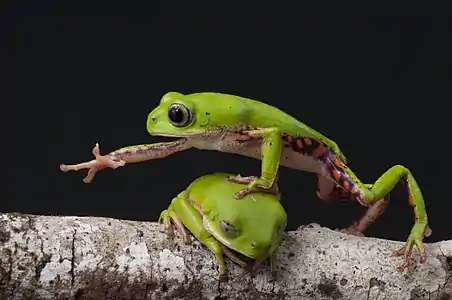Pithecopus rohdei
Pithecopus rohdei, also known as Rohde's leaf frog, Rohde's frog, and Mertens' leaf frog, is a species of frog in the family Phyllomedusidae. The species was previously placed in the genus Phyllomedusa. The species is endemic to southeastern Brazil and occurs at elevations up to 1000 meters above sea level.[1][2][3]
| Pithecopus rohdei | |
|---|---|
 | |
| Scientific classification | |
| Kingdom: | Animalia |
| Phylum: | Chordata |
| Class: | Amphibia |
| Order: | Anura |
| Family: | Phyllomedusidae |
| Genus: | Pithecopus |
| Species: | P. rohdei |
| Binomial name | |
| Pithecopus rohdei Mertens, 1926 | |
| Synonyms[2] | |
| |
Its natural habitats are subtropical or tropical moist lowland forests, moist savanna, rivers, arable land, pastureland, plantations, rural gardens, urban areas, and heavily degraded former forests.[1]
The species is common, adaptable, and is not considered threatened.[1] It is an opportunistic sit-and-wait predator and preys on spiders, larval butterflies, moths and orthopterans.[4] The primary mating season is December to March, however mating at other times have also been reported. Clutches are laid in leaf-made nests on water and eggs fall in underlying streams.[1]
References
- Sergio Potsch de Carvalho-e-Silva, Carlos Alberto Gonçalves da Cruz. (2016). "Pithecopus rohdei". IUCN Red List of Threatened Species. 2016: e.T55862A107300162. doi:10.2305/IUCN.UK.2016-3.RLTS.T55862A107300162.en. Retrieved 11 January 2021.
- Frost, Darrel R. (2021). "Pithecopus rohdei (Mertens, 1926)". Amphibian Species of the World: an Online Reference. Version 6.1. American Museum of Natural History. doi:10.5531/db.vz.0001. Retrieved 11 January 2021.
- Duellman, William E.; Marion, Angela B. & Hedges, S. Blair (2016). "Phylogenetics, classification, and biogeography of the treefrogs (Amphibia: Anura: Arboranae)" (PDF). Zootaxa. 4104 (1): 1–109. doi:10.11646/zootaxa.4104.1.1.
- J. Edson; P. Lima; D. Rödder; M. Solé (June 2010). "Diet of two sympatric Phyllomedusa (Anura: Hylidae) species from a cacao plantation in southern Bahia, Brazil". North-Western Journal of Zoology. 6 (1): 13–24. Retrieved January 10, 2021 – via researchgate.net.
